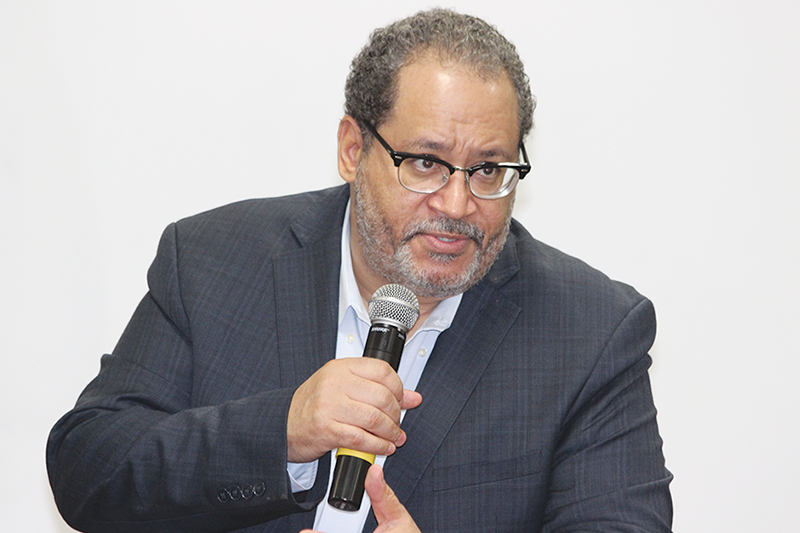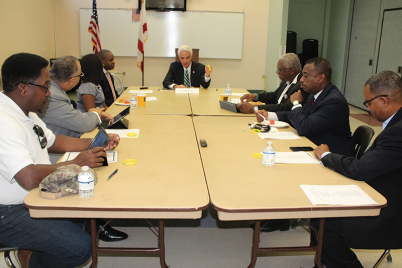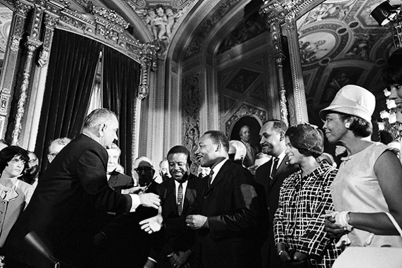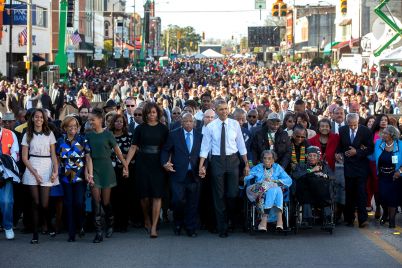Michael Eric Dyson
By J.A. Jones, Staff Writer
PETERSBURG – Last Friday, Oct. 26, community members gathered at Mt. Zion Progressive Missionary Baptist to attend “By Any Vote Necessary: A Conversation with Community Activists around Voting Rights Restoration,” moderated by author, radio host and preacher Dr. Michael Eric Dyson.
The talk featured Dream Defenders’ founder Phillip Agnew, former Florida District 18 congressional candidate attorney Pam Keith and activist Valencia Gunder of Make the Homeless Smile MIAMI.
Throughout, Dyson interspersed his admonitions to vote with humor and James Brown riffs, evoking his Baptist preacher mode when necessary.
Attorney and former Democratic candidate for Florida’s 18th Congressional District Keith explained the plethora of unnecessary amendments on the ballot, calling Florida’s constitution “a repository of miscellaneous,” and did an excellent job of describing how the makeup of our aberrant constitution creates confusion for voters.
While our federal constitution and most state constitutions set out foundational principles and rules – such as the relationship between the individual and state, how the judiciary and legislature work together, what the cabinets are, taxes, etc. — Florida’s constitution complicates that.
Florida’s constitution, stated Keith, “has this weird thing where they load into the constitution a bunch of stuff they can’t get done through the regular legislative process…and that’s wild. We have stuff in our constitution that has absolutely nothing to do with the foundational principles of how municipality functions, how the court functions…nothing to do with any of that.”
She also explained the three ways that amendments proposals get added to the ballot:
- By petition from the voters (citizens’ initiative process) – Amendment 4, which restores voting rights to felons who have paid their debt to society and have returned home to become law-abiding, tax-paying citizens, is only on the ballot because millions of people signed petitions. A show of interest from the people, Keith noted this is an expensive process.
- A joint resolution of the Florida Legislature – usually is limited to procedural legislative matters or redistricting.
- The CRC (Constitutional Revision Commission), which meets every 20 years.
The fourth way, which Keith didn’t mention, is through the Taxation and Budget Reform Commission; established in 2007, it also meets every 20 years, and will not be in session until 2027.
Because the CRC only meets every 20 years, it can fall under either a Republican or Democratic in office. Because the CRC is appointed by the governor, it is “an opportunity for the governor to enshrine into perpetuity the things that he wants done under his leadership,” asserted Keith.
While the first two ways demand that only one issue is put before the voters at a time, the CRC is allowed to bundle together issues, which is why there are so many confusing amendments with multiple issues on the ballot this year.
“The only reason they do it is to confuse and bamboozle you because there’s no other reason to do it,” asserted Keith.
For this reason, while she clarified she couldn’t recommend how anyone should vote; she said she was only voting “yes” on Amendment 4, and “no” on everything else. “Not because there aren’t some good ideas,” she admitted, but she warned that bundling of issues that should not be part of the constitution must be carefully considered.
Valencia Gunder shared a harrowing story of being arrested when a college tuition payment made by check bounced. Because of Florida’s process of booking and rebooking those being extradited from one county to another, what she imagined would take a weekend became a 22-day journey of terror through a number of holding cells en route from Miami-Dade to Leon County.
Along with a felony conviction.
“When people think about returning citizens, they automatically think that these people are murderers, rapists, serial killers…but what a returning citizen looks like actually is completely different,” Gunder stated.
In her last year at Florida A&M University, her final $1,700 tuition check bounced; but when FAMU seemingly dropped the issue, she finished school and returned to Miami. One day she was pulled over for routine traffic stop, which resulted in the officer telling her she was a fugitive in four states.
A rude awakening awaited her; she would have to be extradited back to Tallahassee and would be booked in each facility along the way. She recounted the degradation of having to strip naked before male officers at each booking from one facility to another. She wasn’t given sanitary napkins in a facility in Broward County when she needed them – for a whole week.
During her final transport, her hands and feet were shackled, and she was put in the back of a van with six men.
“I’m from Liberty City, so I can fight a little bit, but I was outnumbered, and I’m shackled.”
Hearing some of the men’s intentions as they boarded, she prepared herself to be raped. Thankfully, a fellow prisoner who knew her from Liberty City happened to be in the van and intervened.
When she finally did go to trial, she was given probation with no jail time, but she was also convicted as a felon. Losing her voting rights, she said, was what hurt her the most.
“I was very proud to have voted for Obama,” she noted, describing the education voting work that was done at FAMU to prepare young adults to vote.
After meeting Amendment 4 activist Desmond Meade, Gunder decided to share her story to make people aware of this part of Florida’s brutal system. Although she is a felon, she never spent time in prison, which, she said, is the case with 40 percent of the 1.7 million people who have lost their rights. Nearly half have never been to court or prison due to the plea-bargaining system.
Activist Phillip Agnew shared his belief that although black and brown people in Florida have “been in the wilderness” for too long, he was confident victory would be achieved because of the hard work being done on the grassroots level.
“We’ve watched as our communities, as our people, as our votes were stolen; we watched the rents go high, we watched our blood pressure go high, and as Valencia can tell you from the climate work she’s doing, we’re watching our oceans get higher.”
While Agnew shared feeling victorious regarding Nov. 6, he cautioned that those “conspiring to steal our joy, to sour the fruits of labor, would not just sit by.” He encouraged listeners to continue the work, so that “as Florida goes, the country goes.”
To reach J.A. Jones, email jjones@theweeklychallenger.com








